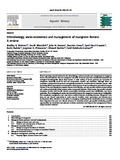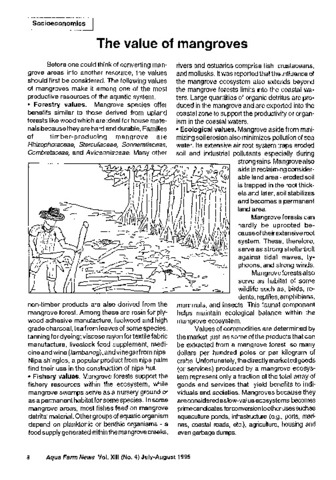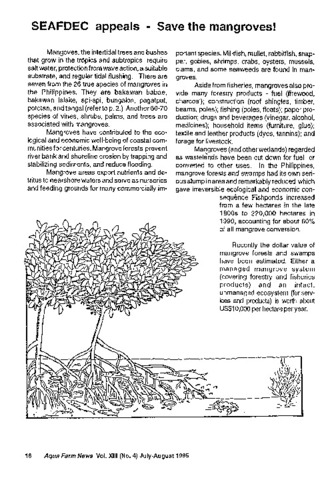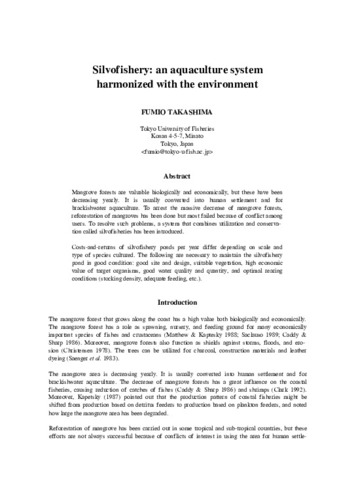Ethnobiology, socio-economics and management of mangrove forests: A review

Associated URL
www.vliz.beTarikh
2008Pengarang
Page views
505Metadata
Lihat penerbitan penuhCited times in Scopus
1376 readers on Mendeley
- Citations
- CrossRef - Citation Indexes: 508
- Policy Citation - Policy Citations: 24
- Scopus - Citation Indexes: 583
- Captures
- Mendeley - Readers: 1370
- Mentions
- Wikipedia - References: 1
- Social Media
- Facebook - Shares, Likes & Comments: 18
Share
abstrak
There is growing research interest in the ethnobiology, socio-economics and management of mangrove forests. Coastal residents who use mangroves and their resources may have considerable botanical and ecological knowledgeable about these forests. A wide variety of forest products are harvested in mangroves, especially wood for fuel and construction, tannins and medicines. Although there are exceptions, mangrove forest products are typically harvested in a small-scale and selective manner, with harvesting efforts and impacts concentrated in stands that are closer to settlements and easiest to access (by land or by sea). Mangroves support diverse, local fisheries, and also provide critical nursery habitat and marine productivity which support wider commercial fisheries. These forests also provide valuable ecosystem services that benefit coastal communities, including coastal land stabilization and storm protection. The overlapping of marine and terrestrial resources in mangroves creates tenure ambiguities that complicate management and may induce conflict between competing interests. Mangroves have been cut and cleared extensively to make way for brackish water aquaculture and infrastructure development. More attention is now given to managing remaining forests sustainably and to restoring those degraded from past use. Recent advances in remotely sensed, geo-spatial monitoring provide opportunities for researchers and planners to better understand and improve the management of these unique forested wetlands.
Suggested Citation
Walters, B. B., Rönnbäck, P., Kovacs, J. M., Crona, B., Hussain, S. A., Badola, R., Primavera, J., Barbier, E., & Dahdouh-Guebas, F. (2008). Ethnobiology, socio-economics and management of mangrove forests: A review. Aquatic Botany , 89(2), 220-236. https://doi.org/10.1016/j.aquabot.2008.02.009
Subjek
biological settlement  ; commercial fishing
; commercial fishing  ; fishery management
; fishery management  ; mangrove swamps
; mangrove swamps  ; mangroves
; mangroves  ; mariculture; marine fisheries
; mariculture; marine fisheries  ; socioeconomic aspects
; socioeconomic aspects  ; anthropogenic changes
; anthropogenic changes  ; economic analysis
; economic analysis  ; Anthropogenic disturbance; human ecology
; Anthropogenic disturbance; human ecology  ; Non-timber forest product; Economic valuation; Ecosystem service
; Non-timber forest product; Economic valuation; Ecosystem service  ; forest management
; forest management 
 ; commercial fishing
; commercial fishing  ; fishery management
; fishery management  ; mangrove swamps
; mangrove swamps  ; mangroves
; mangroves  ; mariculture; marine fisheries
; mariculture; marine fisheries  ; socioeconomic aspects
; socioeconomic aspects  ; anthropogenic changes
; anthropogenic changes  ; economic analysis
; economic analysis  ; Anthropogenic disturbance; human ecology
; Anthropogenic disturbance; human ecology  ; Non-timber forest product; Economic valuation; Ecosystem service
; Non-timber forest product; Economic valuation; Ecosystem service  ; forest management
; forest management 
Koleksi
- AQD Journal Articles [1240]
Related items
Showing items related by title, author, creator and subject.
-
The value of mangroves
Southeast Asian Fisheries Development Center, Aquaculture Department (Aquaculture Department, Southeast Asian Fisheries Development Center, 1995)The article presents the forestry, fishery and ecological values of mangroves. Studies on the measurement of the economic value of mangroves that were conducted in Thailand, Indonesia and Ecuador are also presented. -
SEAFDEC appeals - Save the mangroves!
Southeast Asian Fisheries Development Center, Aquaculture Department (Aquaculture Department, Southeast Asian Fisheries Development Center, 1995)The article presents action plans that could be done to stop and prevent further degradation of the mangrove ecosystem. These action plans are: conservation, mangrove reforestation and the practice of ecologically sound ... -
Silvofishery: An aquaculture system harmonized with the environment
Takashima, Fumio (Aquaculture Department, Southeast Asian Fisheries Development Center, 2000)Mangrove forests are valuable biologically and economically, but these have been decreasing yearly. It is usually converted into human settlement and for brackishwater aquaculture. To arrest the massive decrease of mangrove ...




